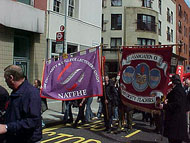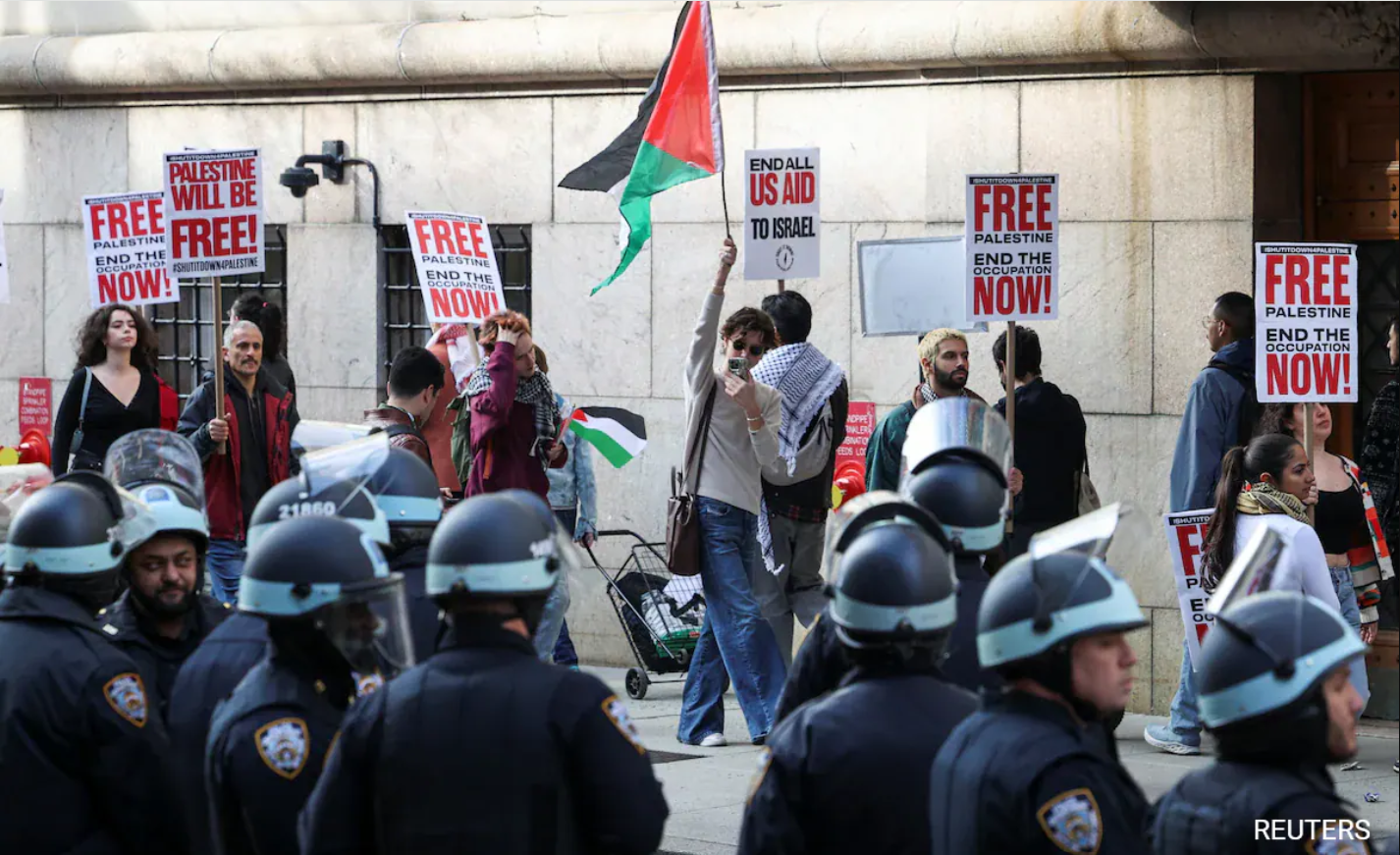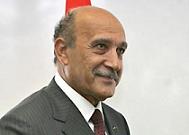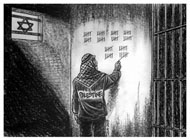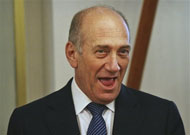“Boycott” seems to have been adopted as the word de jour in the press this week. There have been calls recently by deposed Hamas Prime Minister, Ismail Haniyeh, for Arab states to “boycott” the November Peace Summit in Maryland; there have been calls by Palestinian activists to “boycott” the One Voice Movement on suspicion that it is an Israeli funded initiative, spreading the wrong message, misleading the public and not taking major Palestinian grievances into consideration; and lastly, there have been multiple references to the long attempted academic “boycott” of Israelis which this week was served a massive blow. Instead of Israeli academics and institutions being boycotted, the Palestinian Campaign for the Academic and Cultural Boycott of Israel, which had planned to visit the UK, liaise with their peers at British universities and speak on the Israeli boycott were told by their patron, the University and College Union [UCU], that their tour had been cancelled after various recommendations from legal consultations.
At the UCU May Conference in Bournemouth, the educational institution, by a vote of 158-99, decided to put Motion 30 into operation which called upon the institution to circulate the boycott requested by Palestinian trade unions to all branches and rally lecturers to “consider the moral implications of the existing and proposed links with Israeli academic institutions”. By this act, the UCU hoped to unite behind the Palestinian cause as well as instigate and exert some international pressure on Israel regarding their inhumane treatment of Palestinians in the Occupied Territories. However, just a few months after this somewhat concrete show of solidarity, UCU Secretary General, Sally Hunt, announced that the academic boycott was not a priority and none of the 120,000 members of their organization would back it.
What ensued was a backlash which increased sympathy and support for Israel and their academic institutions. Individuals from all areas of academics and politics denounced the boycott calling it a curb on academic freedom, highly ineffective and ethically unjustified, some even deeming it anti-Semitic. The opposition was so fierce and influential that now the situation has exacerbated and created an air of uncertainty. As a result, Palestinian academics have been forbidden from coming and speaking in the UK.
There has been much speculation over the reason for the most recent stifling of and greatly criticized academic boycott. One thought maintains that the power of the Israeli lobby in the US and UK is such that the boycott was expected to fail. The other theory is that the UCU, like its predecessors, took the wrong angle of resisting occupation by prohibiting a party their right to freedom of speech and expression of thought. Both these explanations offer a credible enough insight.
The Israeli lobby has a substantial support base of influential groups and individuals. One must only glance at Mearsheimer and Walt and their new in-depth book on “the Israel Lobby and US foreign policy” to understand how prominent and powerful the supporters of Israel are in America. In addition, it is true that the ramifications of the Bournemouth Conference focused on Israel threatening their own boycott on the UK, which could be construed as being the decisive force behind the retraction of the boycott. Once plans for the boycott had been released, eminent lawyer, Chair at Harvard University and renowned Israel supporter, Alan Dershowitz, teamed up with equally respected British lawyer, Antony Julius, to oppose these “pitiful arguments”. Between the two of them, they rallied one hundred lawyers on each side of the Atlantic and warned that they would “devastate and bankrupt” the British academic institutions. Despite British Prime Minister at the time, Tony Blair, personally ringing his counterpart Ehud Olmert in Israel, there were still reports that Israel would reply to this “boycott” by banning imports from Britain.
Amjad Barham from the Palestinian Federation of Unions of University Professors and Employees declared that Israel operates under a modern form of McCarthyism. I completely agree. The bullying, censorship and intimidation of the Palestinians attests to this. Barham also figures that Israel resorts to this behavior since they have lost confidence in their ability to rationally refute their case. I also agree. However, in this instance, the opposition mainly stemmed from the direction taken by the UCU rather than Israel’s specific role.
By threatening to boycott Israeli academic institutions, the international community suddenly used the prevention of freedom of speech, the expression of liberal thought, the right to assembly and discussion as going against all cornerstones of democracy practiced and supported fully by British educational institutions. By halting funding to Israeli institutions, visits, conferences and joint publishing deals, the UCU, according to those against the boycott, had violated the very principles they purport to represent and protect.
This moral argument of using academics to combat political situations has been abundantly clear since the inception of academic boycotts against Israel in 2002 when Steven and Hilary Rose proposed that an academic boycott of Israel could lead to more active international intervention.
In 2005 the Association of University Teachers [AUT] chose to boycott the Universities of Haifa and Bar-Ilan. However, opponents to this motion claimed that universities enjoy political independence and boycotts actually act as a deterrent in the peace process. A month later the AUT cancelled the action.
In 2006 the National Association of Teachers in Further and Higher Education [NATFHE] voted to boycott those Israelis who did not speak out against their government. The same argument developed centering on compromising the autonomy of academic institutions and the boycott was ceased.
This latest boycott proposal was met with similar disapproval. In September, the Liberal Democrat Conference condemned UCU as passing a “perverse decision” and moved to reject the proposal as it defied the principle of freedom of speech. Once the boycott had been cancelled as it proved to be “infringing discrimination legislation”, David Newman, professor of geopolitics at Ben Gurion University said that he was glad that they had “seen sense” and that universities were a haven for open dialogue, freedom of speech and liberal thought. Labor Chair of friends with Israel, MP Andrew Gwynee, declared that it wasn’t only illegal but undermined the academic freedom and integrity of Britain as well as contributing nothing to peace. Lastly, Tzipi Livni, Israeli Foreign Minister declared that “limiting freedom of speech is inherently wrong”. In addition to these, there were many other like minded responses from high ranking individuals.
All this talk of barriers and obstacles to freedom of speech, unfairness and ineffectiveness in achieving a peaceful solution raises another issue, a double standard if you will, which receives very little exposure.
In an article written by John Pilger on the academic boycott of Israel, he quoted John Chalcraft from the London School of Economics who confirmed that “the Israeli academy has long provided intellectual, linguistic, logistical, technical, scientific and human support for an occupation in direct violation of international law”. Despite all the opportunity for free speech available, Chalcraft continues that none of them have taken a stand.
And what happens when academics do speak out against Israel and express their freedom of speech? Edward Said’s offices in Columbia University were burned down; Pilger received death threats after his film “Palestine is still the issue”; Mearsheimer and Walt were cast into academic ostracism for their article on the Israel Lobby in the London Review of Books; Norman Finkelstein was unexpectedly denied tenure at DePaul University for his “unprofessional personal attacks”; Uri Avnery, German / Israeli journalist and former member of the Knesset received death threats on account of his belief for non-Orthodox interference in religious and political life; and Ilan Pappe, a reputed Israeli historian, was asked to resign from Haifa University after expressing his support for the Israeli boycott.
One must not forget the treatment of the up and coming minds of the future. On Monday it was revealed that Saed Hasan, a Palestinian accepted on the Kellogg-Recanati International Executive MBA program, had been refused a permit by the Israeli military to enter Israel. Hasan is now in danger of losing his place, a scenario that none of the 92% of foreigners and Israelis on the joint Northwestern-Tel Aviv University program have to go through.
While examining actions by Israeli academic institutions, it is also important to note the following. Part of the land on which the University of Tel Aviv is built belongs to Sheikh Muwannis and used to be part of a Palestinian village whose inhabitants were expelled by Jewish militias in 1948. The Hebrew University is built on 800 acres of land illegally seized from Palestinian private owners in the West Bank after 1967. Finally, Bar-Ilan University has a branch on an illegal Israeli settlement in the West Bank.
Whether it is a moral problem of using academic institutions to influence a complex political situation promoting exclusion or forbidding freedom of speech as leverage is one issue not to be confused with whether academic boycotts, or any type of boycotts, actually work. Uri Avnery believes that the problem with Israel is internal and no amount of external pressure will change how Israel operates. Is this the case?
Many comparisons have been made between the Israeli / Palestinian issue and the apartheid in South Africa, so it would be fitting to investigate whether boycotts worked in that instance. Opinions, as one would expect, vary, mainly due to the difficulty in evaluating the use of boycotts, since they don’t exist in a vacuum – they are normally implemented while other political measures are in place.
As in the example of South Africa, it is generally believed that the economic sanctions implemented by President Reagan in 1986 followed by the election of de Klerk in 1989, who abolished the Separate Amenities Act and released Nelson Mandela, were the catalysts for change in South Africa.
However, it is impossible to conclude that boycotts initiated by the African National Congress in the 60s, namely the academic, cultural, consumer and economic ones were utterly counterproductive. This is especially the case in sports. South Africa was and is a very proud sporting nation so its omission from the Olympics in 1962, its expulsion from various international sporting bodies and its generally tainted sporting reputation around the world must have greatly distressed the country.
Debates concerning the legitimacy and value of all boycotts, not just academic ones, will always exist. Are academic boycotts unjustified, irrational even racist attacks which curb freedom of speech and prove just to be an ineffective weapon in a political conflict arsenal; or, are they a crucial element in the tapestry of measures used to apply additional international pressure on the oppressive party?
In South Africa it was difficult to decipher with any true accuracy.
However, in an area which Mandela deems the “greatest moral issue” in the world and what Bishop Desmond Tutu describes as 10 times worse than the apartheid in South Africa, there are seriously limited options available to Palestinians. Hence, I am compelled to take the opinion that an academic boycott, along with other boycotts, such as the 1.4 million member UNISON group of UK Public Servants, can create in time, an environment of intense pressure which may encourage change and induce people to take notice. Academics are to Israel what sport is to South Africa – the area where they take the most pride. When all recent political activities spin into a web of inactivity with no future solution in sight and with atrocities still inflicted on Palestinians, all possible avenues must be considered to work towards progress in alleviating this political and humanitarian disaster.




